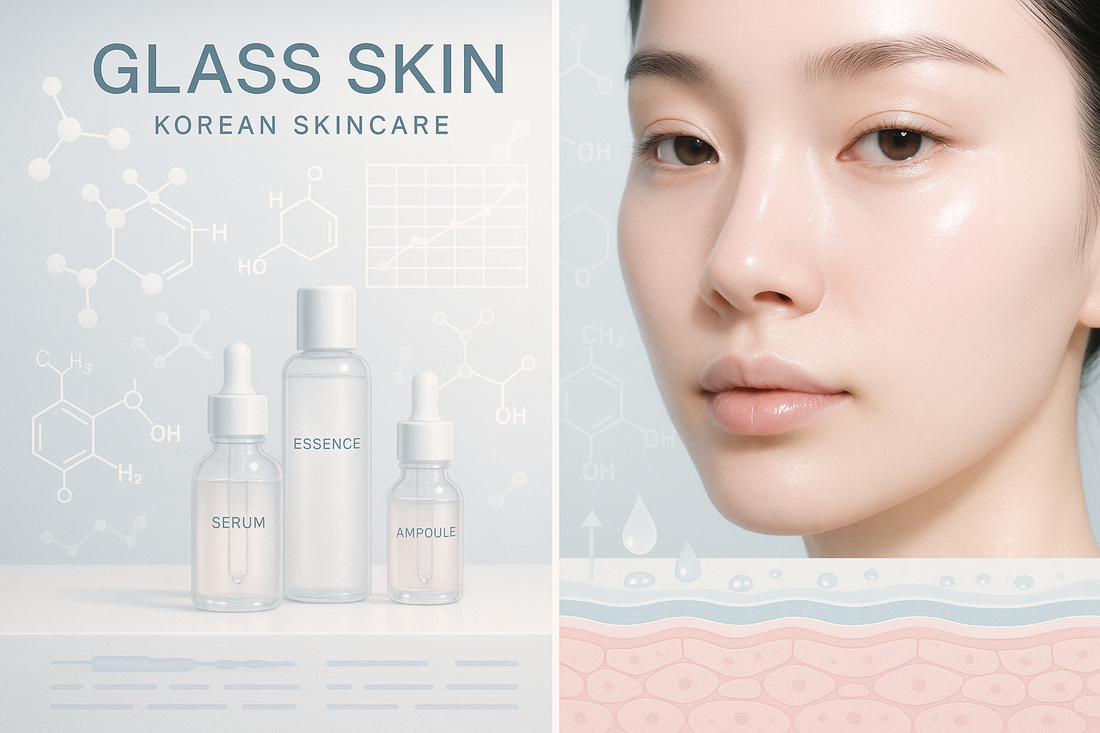The Science of Glass Skin: Korean Skincare Backed by Research
What Is Glass Skin?
"Glass skin" refers to a complexion that appears luminous, smooth, poreless, and crystal clear. Though it may look like an Instagram filter, the truth is that glass skin is grounded in hydration and overall skin health. According to dermatology studies from PubMed, hydrated skin reflects light more evenly and maintains a more uniform texture — key qualities of the glass skin look.
True glass skin is:
- Hydrated and dewy, not greasy
- Even-toned, with reduced hyperpigmentation or redness
- Firm and bouncy with enhanced elasticity
- Free from surface buildup or flaky skin
Scientific Backing: What Research Says
Research from Seoul National University and international dermatological journals confirms that consistent hydration, exfoliation, and barrier repair are foundational to achieving radiant skin. The use of ingredients like hyaluronic acid, niacinamide, and Centella Asiatica — all common in K-beauty — has been shown to:
- Enhance moisture retention (Hyaluronic Acid)
- Reduce pigmentation and improve tone (Niacinamide)
- Support wound healing and soothe irritation (Centella Asiatica)
Where Did Glass Skin Start?
The term "glass skin" became popularized through the Korean beauty (K-Beauty) movement. Unlike Western skincare, which often emphasizes fast results, K-beauty values prevention, long-term hydration, and layering of gentle products. Cultural beauty standards in Korea — supported by historical texts and modern dermatology clinics — prioritize clear, even, moisturized skin as the foundation of beauty.
The Glass Skin Routine (Step-by-Step)
Below is a K-beauty-inspired routine that aligns with clinical skincare principles:
-
Double Cleansing: Oil-based cleanser followed by a water-based foam.
Products: ICD Moisture Cleansing Oil & Incellderm Snow Enzyme Cleanser EX -
Hydrating Toner or Mist: Helps prep the skin for active ingredients.
Products: ICD Two Phase Oil Mist & Calming Balance Gel -
Targeted Serums: Niacinamide, hyaluronic acid, peptides.
Products: ICD Dermatology First Package EX -
Moisturizer: Barrier repair using ceramides, fatty acids.
Products: ICD Dermatology Cream -
Sunscreen: SPF 30+ every day.
Product: Incellderm Aqua Protection Sunscreen -
Gentle Exfoliation: 1–3x weekly using enzymes.
Product: ICD Cleansing Powder Wash -
Hydrating Masks: Optional 2–3x per week.
Product: Incellderm Collagen 100 Melting Sheet
Glass Skin vs. Oily Skin
Don’t confuse healthy shine with excess oil. According to the American Academy of Dermatology, oily skin produces sebum excessively, leading to shine and breakouts. Glass skin, on the other hand, is hydrated and smooth with a healthy glow — not a greasy film.
What Science Says About Results
A study published in the Journal of Cosmetic Dermatology showed that consistent skincare routines using serums, humectants, and SPF led to significant improvements in skin texture and hydration in as little as 4 weeks. K-beauty routines build on this with multi-layer hydration and protective ingredients.
Final Thoughts: A Realistic Path to Glass Skin
Glass skin isn’t about filters or perfection. It’s about science-backed skincare habits, gentle ingredients, and a consistent approach. Thanks to brands like Riman ICD Incellderm, achieving the glass skin glow is now more accessible than ever.
Shop authentic Korean skincare at LuminaLabelle.com and explore our curated collection of Riman ICD Incellderm products.

